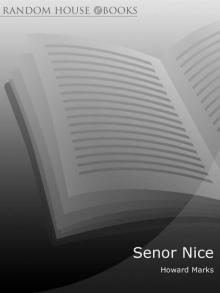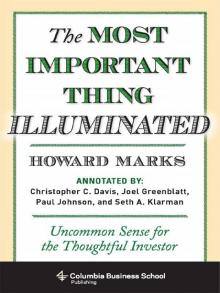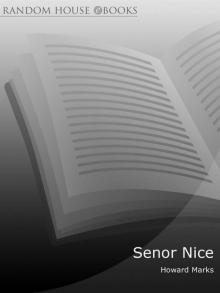- Home
- Howard Marks
The Howard Marks Book of Dope Stories Page 3
The Howard Marks Book of Dope Stories Read online
Page 3
Jake undressed and got his swimming trunks from his bike, put them on and went looking for Skyman. He walked back towards the spot where they were painting the dinghy. It was no longer there. He looked out to sea, the boat was still there with the dinghy tied up astern. Skyman came up from below with a broom and bucket. He made out the name of the boat – Seafree. Jake waved. Skyman put down his bucket and waved back. Jake took a long run to the water and dived in and started swimming towards the boat. He thought about his parents, it was the first time he had ever stayed away from home under such circumstances and was amazed at himself that he felt no anxiety, it was more an obligation to phone and let his folks know that he was okay. He made a mental note to do that and went back to the task of swimming all the way out to Seafree. It was a tidy swim by most standards but he was a fit young guy and he made it easy.
Skyman tossed a ladder over the side for Jake and invited him to come aboard. As Jake got on board and sat on the rails to give his heart time to adjust its beat, he noticed the sound of jazz and that familiar smell of ganja coming from below. Skyman came over and extended his hand.
‘Hey, man! How you feeling today?’
Jake smiled, full of confidence with his new being.
‘Great! But I wasn’t doing so good yesterday! I only just made it to the hut.’
Skyman smiled back.
‘Welcome to the club.’
Calypso Train, 2001
O thou weed!
Who are so lovely fair and smell’st so sweet
That the sense aches at thee, wouldst thou hadst ne’er been born
William Shakespeare
H. H. Kane
A Hashish-House in New York:
The Curious Adventures of an Individual Who Indulged in a Few Pipefuls of the Narcotic Hemp
‘AND SO YOU think that opium-smoking as seen in the foul cellars of Mott Street and elsewhere is the only form of narcotic indulgence of any consequence in this city, and that hashish, if used at all, is only smoked occasionally and experimentally by a few scattered individuals?’
‘This is certainly my opinion, and I consider myself fairly well informed.’
‘Well, you are far from right, as I can prove to you if you care to inform yourself more fully on the subject. There is a large community of hashish smokers in this city, who are daily forced to indulge their morbid appetites, and I can take you to a house uptown where hemp is used in every conceivable form, and where the lights, sounds, odors, and surroundings are all arranged so as to intensify and enhance the effects of this wonderful narcotic.’
‘I must confess that I am still incredulous.’
‘Well, if it is agreeable to you, meet me at the Hoffman House reading-room tomorrow night at ten o’clock, and I think I shall be able to convince you.’
The above is the substance of a conversation that took place in the lobby of a downtown hotel between the writer of these lines and a young man about thirty-eight years of age, known to me for some years past as an opium smoker. It was through his kindness that I had first gained access to and had been able to study up the subject of opium-smoking. Hence I really anticipated seeing some interesting phases of hemp indulgence, and was not disappointed. The following evening at precisely ten o’clock I met the young man at the Hoffman House, and together we took a Broadway car uptown, left it at Forty-second Street, and walked rapidly toward the North River, talking as we went.
‘You will be probably be greatly surprised at many things you will see tonight,’ he said, ‘just as I was when I was first introduced to the place by a friend. I have traveled over most of Europe, and have smoked opium in every joint in America, but never saw anything so curious as this, nor experienced any intoxication so fascinating yet so terrible as that of hashish.’
‘Are the habitués of this place of the same class as those who frequent the opium-smoking dives?’
‘By no means. They are about evenly divided between Americans and foreigners; indeed, the place is kept by a Greek, who has invested a great deal of money in it. All the visitors, both male and female, are of the better classes, and absolute secrecy is the rule. The house has been opened about two years, I believe, and the number of regular habitués is daily on the increase.’
‘Are you one of the number?’
‘I am, and find the intoxication far pleasanter and less hurtful than that of opium. Ah! Here we are.’
We paused before a gloomy-looking house, entered the gate and passed up the steps. The windows were absolutely dark, and the entranceway looked dirty and desolate. Four pulls at the bell, a pause and one more pull were followed by a few moments’ silence, broken suddenly by the sound of falling chain, rasping bolt and the grinding of a key in the lock. The outer door was cautiously opened and at a word from my companion we passed into the vestibule. The outer door was carefully closed by someone whom I could not distinguish in the utter darkness. A moment later the inner door was opened and never shall I forget the impression produced by the sudden change from total darkness to the strange scene that met my eyes. The dark vestibule was the boundary line separating the cold, dreary streets and the ordinary world from a scene of Oriental magnificence.
A volume of heavily scented air, close upon the heels of which came a deadly sickening odor, wholly unlike anything I had ever smelled, greeted my nostrils. A hall lamp of grotesque shape flooded the hall with a subdued violet light that filtered through crenated disks of some violet fabric hung below it. The walls and ceilings, if ever modern, were no longer so, for they were shut in and hung by festoons and plaits of heavy cloth fresh from Eastern looms. Tassels of blue, green, yellow, red, and tinsel here and there peeped forth, matching the curious edging of variously colored beadwork that bordered each fold of drapery like a huge procession of luminous ants, and seemed to flow into little phosphorescent pools wherever the cloth was caught up. Queer figures and strange lettering, in the same work, were here and there disclosed upon the ceiling cloth.
Along one side of the hall, between two doors, were ranged huge tubs and pots of majolica-like ware and blue-necked Japanese vases, in which were plants, shrubs, and flowers of the most exquisite color and odor. Green vines clambered up the walls and across the ceiling, and catching their tendrils in the balustrades of the stairs (which were also of curious design), threw down long sprays and heavy festoons of verdure.
As my companion, who had paused a moment to give me time to look about me, walked toward the far end of the hall, I followed him, and passed into a small room on the right, where, with the assistance of a colored servant, we exchanged our coats, hats and shoes for others more in keeping with our surroundings. First a long plush gown, quilted with silk down the front and irregularly ornamented in bead and braid with designs of serpents, flowers, crescents, and stars, was slipped on over the head. Next a tasseled smoking-cap was donned, and the feet encased in noiseless list slippers. In any other place or under any other circumstances I should have felt ridiculous in this costume, but so in keeping was it with all I had seen, and so thoroughly had I seemed to have left my everyday self in the dark vestibule, that I felt perfectly at home in my strange dress. We next crossed the hall to a smaller room, where a young man, apparently a Frenchman, furnished us, on the payment of two dollars each, with two small pipes and a small covered bronze cup, or urn, filled with a dry green shrub, which I subsequently learned was gunjeh (the dried tops and leaves of the hemp plant), for smoking. My friend, on the payment of a further sum, obtained a curious little box which contained some small black lozenges, consisting of the resin of hemp, henbane, crushed datura seeds, butter and honey, and known in India as majoon, among the Moors as el mogen.
Passing from this room we ascended the richly carpeted stairs, enarbored by vines, and paused upon a landing from which three doors opened. Upon one, a pink card bore Dryden’s line, ‘Take the good the gods provide thee.’ The knob turned by my friend’s hand allowed the door to swing open, and, welcomed by a spice breeze from India
, we were truly in paradise.
‘This,’ he said, in a whisper, ‘is the public room, where anyone having pipe or lozenge, and properly attired, may enter and indulge – eat, smoke, or dream, as best suits him.’
Wonder, amazement, admiration, but faintly portray my mental condition. Prepared by what I had already seen and experienced for something odd and Oriental, still the magnificence of what now met my gaze far surpassed anything I had ever dreamed of, and brought to my mind the scenes of the Arabian Nights, forgotten since boyhood until now. My every sense was irresistibly taken captive, and it was some moments before I could realise that I really was not the victim of some dream, for I seemed to have wholly severed my connection with the world of today, and to have stepped back several centuries into the times of genii, fairies and fountains – into the very heart of Persia or Arabia. Not an inharmonious detail marred the symmetry of the whole. Beneath, my feet sank almost ankle-deep into a velvet carpet – a sea of subdued colors. Looked at closely, I found that the design was that of a garden: beds of luxurious flowers, stars and crescents, squares and diamond-shaped plots, made up of thousands of rare exotics and richly colored leaves. Here a brook, edged with damp verdure, from beneath which peeped coy violets and tiny bluebells; there a serpentine graveled walk that wound in and out amongst the exquisite plants, and everywhere a thousand shrubs in bloom or bud. Above, a magnificent chandelier, consisting of six dragons of beaten gold, from whose eyes and throats sprang flames, the light from which, striking against a series of curiously set prisms, fell shattered and scintillating into a thousand glancing beams that illuminated every corner of the room. The rows of prisms being of clear and variously colored glass, and the dragons slowly revolving, a weird and ever-changing hue was given to every object in the room.
All about the side of the spacious apartment, upon the floor, were mattresses covered with different-colored cloth, and edged with heavy golden fringe. Upon them were carelessly strewn rugs and mats of Persian and Turkish handicraft, and soft pillows in heaps. Above the level of these divans there ran, all about the room, a series of huge mirrors framed with gilded serpents intercoiled, effectually shutting off the windows. The effect was magnificent. There seemed to be twenty rooms instead of one, and everywhere could be seen the flame-tongued and fiery-eyed dragons slowly revolving, giving to all the appearance of a magnificent kaleidoscope in which the harmonious colors were ever-blending and constantly presenting new combinations.
Just as I had got thus far in my observations I caught sight of my friend standing at the foot of one of the divans and beckoning to me. At the same moment I also observed that several of the occupants of other divans were eying me suspiciously. I crossed to where he was, esteeming it a desecration to walk on such a carpet, and, despite my knowledge to the contrary, fearing every moment to crush some beautiful rose or lily beneath my feet. Following my friend’s example, I slipped off my list foot gear, and half reclined beside him on the divan and pillows, that seemed to reach up and embrace us. Pulling a tasseled cord that hung above our heads, my friend spoke a few words to a gaudily turbaned colored servant who came noiselessly into the room in answer to his summons, disappeared again, and in a moment returned bearing a tray, which he placed between us. Upon it was a small lamp of silver filigree-work, two globelike bowls, of silver also, from which protruded a long silver tube and a spoonlike instrument. The latter, I soon learned, was to clean and fill the pipes. Placing the bronze jar of hashish on the tray, my friend bade me lay my pipe beside it, and suck up the fluid in the silver cup through the long tube. I did so, and found it delicious.
‘That,’ he said, ‘is tea made from the genuine coca leaf. The cup is the real mate and the tube a real bombilla from Peru. Now let us smoke. The dried shrub here is known as gunjeh, and is the dried tops of the hemp plant. Take a little tobacco from that jar and mix with it, else it will be found difficult to keep it alight. These lozenges here are made from the finest Nepal resin of the hemp, mixed with butter, sugar, honey, flour, pounded datura seeds, some opium and a little henbane, or hyoscyamus. I prefer taking these to smoking, but, to keep you company, I will also smoke tonight. Have no fear. Smoke four or five pipefuls of the gunjeh, and enjoy the effect. I will see that no harm befalls you.’
Swallowing two of the lozenges, my guide filled our pipes, and we proceeded to smoke and watch the others. These pipes, the stems of which were about eighteen inches in length, were incrusted with designs in varicolored beads, strung on gold wire over a ground of some light spirally twisted tinsel, marked off into diamond-shaped spaces by thin red lines. From the stem two green and yellow silken tassels depended. A small bell-shaped piece of clouded amber formed the mouthpiece, while at the other end was a small bowl of red clay scarcely larger than a thimble. As I smoked I noticed that about two-thirds of the divans were occupied by persons of both sexes, some of them masked, who were dressed in the same manner as ourselves. Some were smoking, some reclining listlessly upon the pillows, following the tangled thread of a hashish reverie or dream. A middle-aged woman sat bolt upright, gesticulating and laughing quietly to herself; another, with lackluster eyes and dropped jaw, was swaying her head monotonously from side to side. A young man of about eighteen was on his knees, praying inaudibly; and another man, masked, paced rapidly and noiselessly up and down the room, until led away somewhere by the turbaned servant.
As I smoked, the secret of that heavy, sickening odor was made clear to me. It was the smell of burning hashish. Strangely enough, it did not seem to be unpleasant any longer, for, although it rather rasped my throat at first, I drew large volumes of it into my lungs. Lost in lazy reverie and comfort, I tried to discover whence came the soft, undulating strains of music that had greeted me on entering, and which still continued. They were just perceptible above the silvery notes of a crystal fountain in the centre of the room, the falling spray from which plashed and tinkled musically as it fell from serpents’ mouths into a series of the very thinnest huge pink shells held aloft by timid hares. The music seemed to creep up through the heavy carpet, to ooze from the walls, to flurry, like snowflakes, from the ceiling, rising and falling in measured cadences unlike any music I had ever heard. It seemed to steal, now softly, now merrily, on tiptoe into the room to see whether we were awake or asleep, to brush away a tear, if tear there was, or gambol airily and merrily, if such was our humor, and then as softly, sometimes sadly, to steal out again and lose itself in the distance. It was just such music as a boatful of fairies sailing about in the clear water of the fountain might have made, or that with which an angel mother and would sing its angel babe to sleep. It seemed to enter every fiber of the body, and satisfy a music-hunger that had never before been satisfied. I silently filled my second pipe, and was about to lapse again into a reverie that had become delightfully full of perfect rest and comfort, when my companion, leaning toward me, said:
‘I see that you are fast approaching Hashishdom. Is there not a sense of perfect rest and strange, quiet happiness produced by it?’
‘There certainly is. I feel supremely happy, at peace with myself and all the world, and all that I ask is to be let alone. But why is everything so magnificent here? Is it a whim of the proprietor, or an attempt to reproduce some such place in the East?’ I asked.
‘Possibly the latter; but there is another reason that you may understand better later. It is this: the color and peculiar phases of a hashish dream are materially affected by one’s surroundings just prior to the sleep. The impressions that we have been receiving ever since we entered, the lights, odors, sounds and colors, are the strands which the deft fingers of imagination will weave into the hemp reveries and dreams, which seem as real as those of everyday life, and always more grand. Hashish eaters and smokers in the East recognized this fact, and always, prior to indulging in the drug, surrounded themselves with the most pleasant sounds, faces, forms, etcetera.’
‘I see,’ I answered, dreamily. ‘But what is there behind those curtains that
I see moving now and again?’ The heavy curtains just opposite where we lay seemed to shut in an alcove.
‘There are several small rooms there,’ said my companion, ‘shut off from this room by the curtains you see move. Each is magnificently fitted up, I am told. They are reserved for persons, chiefly ladies, who wish to avoid every possibility of detection, and at the same time enjoy their hashish and watch the inmates of this room.’
‘Are there many ladies of good social standing who come here?’
‘Very many. Not the cream of the demi-monde, understand me, but ladies. Why, there must be at least six hundred in this city alone who are habituées Smokers from different cities, Boston, Philadelphia, Chicago, and especially New Orleans, tell me that each city has its hemp retreat, but none so elegant as this.’
And my companion swallowed another lozenge and relapsed into dreamy silence. I too lay back listlessly, and was soon lost in reverie, intense and pleasant. Gradually the room and its inmates faded from view; the revolving dragons went swifter and more swiftly, until the flaming tongues and eyes were merged into a huge ball of flame, that, suddenly detaching itself with a sharp sound from its pivot, went whirling and streaming off into the air until lost to sight in the skies. Then a sudden silence, during which I heard the huge waves of an angry sea breaking with fierce monotony in my head. Then I heard the fountain; the musical tinkle of the spray as it struck upon the glass grew louder and louder, and the notes longer and longer, until they merged into one clear, musical bugle note that woke the echoes of a spring morning, and broke sharp and clear over hill and valley, meadowland and marsh, hilltop and forest. A gaily caparisoned horseman, bugle in hand, suddenly appeared above a hillcrest. Closely following, a straggling group of horsemen riding madly. Before them a pack of hounds came dashing down the hillside, baying deeply. Before them I, the fox, was running with the speed of desperation, straining every nerve to distance or elude them. Thus for miles and miles I ran on until at last, almost dead with fright and fatigue, I fell panting in the forest. A moment more and the cruel hounds would have had me, when suddenly a little field mouse appeared, caught me by the paw, and dragged me through the narrow entrance to her nest. My body lengthened and narrowed until I found myself a serpent, and in me rose the desire to devour my little preserver, when, as I was about to strike her with my fangs, she changed into a beautiful little fairy, tapped my ugly black flat head with her wand, and as my fangs fell to earth I resumed my human shape. With the parting words, ‘Never seek to injure those who endeavour to serve you,’ she disappeared.

 Mr Nice
Mr Nice The Howard Marks Book of Dope Stories
The Howard Marks Book of Dope Stories Senor Nice: Straight Life From Wales to South America
Senor Nice: Straight Life From Wales to South America The Score
The Score Sympathy for the Devil
Sympathy for the Devil The Most Important Thing Illuminated
The Most Important Thing Illuminated Senor Nice
Senor Nice Howard Marks' Book of Dope Stories
Howard Marks' Book of Dope Stories